83 F. high on Wednesday in the Twin Cities,
the first cooler-than-average day since June 25.
21 days/row above 85 F. in the Twin Cities, second most on record.
84 F. average high for July 18.
98 F. high temperature on July 18, 2011.
90+ F. highs expected from Friday thru Thursday of next week.
35+ days above 90 F. this year seems more likely than ever by late September in the Twin Cities.
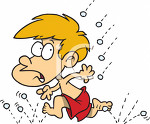 .83
.83" rain fell at Twin Cities International Airport in the 24 hour period ending 7 pm yesterday.
2.42" rain has fallen so far in July, .12" more than average, to date.
Shocking: Another Hot Surge. I don't see 100-degree
heat, but all the models are suggesting low to mid 90s Friday and
Saturday, in fact we may exceed 90 F. every day next week, except for
next Friday. Bottom line: 7 days/row above 90 next week - we could
easily see 35 days above 90 by late September at the rate we're going.
Average is 13. Graph above: Iowa State.
 This Thing Isn't Over Just Yet.
This Thing Isn't Over Just Yet.
The NOAA map above shows the projected maximum heat index next Tuesday,
from 100-105 F. in the Twin Cities, closer to 110-115 at Sioux Falls, a
big area from South Dakota to St. Louis to the Carolinas sweltering
under a 105-110 F. heat index.
Click here to see the 3-7 Day Heat Index Outlook, courtesy of NOAA.
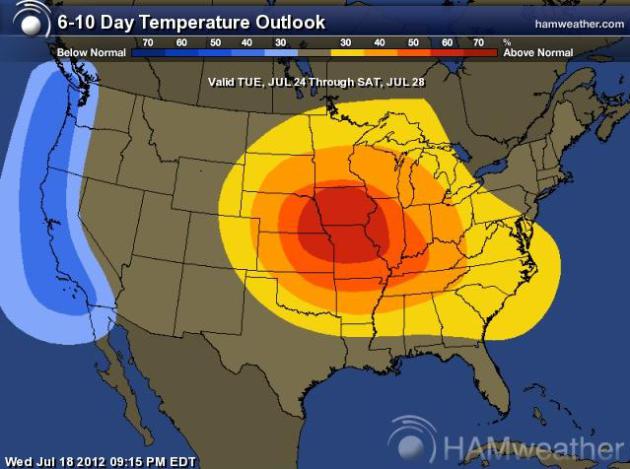 Sweltering Bulls-Eye
Sweltering Bulls-Eye.
NOAA's CPC shows the center of the heat wave over the Midwest through
most of next week. There are some signs that the worst of the
heat/drought may shift into the Central Plains by the first week of
August. Map above:
Ham Weather.
106 F. at St. Louis Wednesday, marking the 8th day this summer of 105+; record is 10 days back in 1934.
1,500. Average number of Americans who perish from
the heat every year in the USA. That's more than die in floods,
hurricanes, tornadoes and blizzards combined. In many of these deaths,
heat is a force-multiplier, compounding and aggravating other heart or
respiratory conditions that ultimately result in death. Details from
NOAA below.
"
Throughout the Midwest, farmers are seeing signs of damaged
crops. In the 18 states that produce most of our corn, only 31% of the
crops were rated good or excellent this week, that’s down from 40% last
week, according to the U.S. Department of Agriculture. This same time last year, 66% of corn crops were rated good or excellent." - from a CNN article focused on the growing drought; details below. AP Photo: Nati Harnik.
"
The American Thoracic Society -- the professional association of lung doctors -- said
climate change is especially dangerous for children and senior
citizens because their lungs are more vulnerable to respiratory
diseases caused by smog." - from a Huffington Post story focused on the potential health hazards of climate change below.
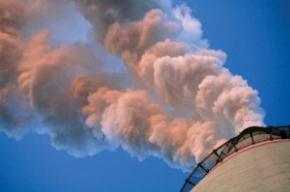 5 million ton
5 million tons. The average U.S. family releases 50 million tons of CO2 into the atmosphere, annually.
9 billion tons of carbon is released into the atmosphere, globally, every year - as CO2. Source: PBS NOVA.
70% "
In a poll taken July 12-16, 70 percent of
respondents said they think the climate is changing, compared with 65
percent in a similar poll in March. Those saying it’s not taking place
fell to 15 percent from 22 percent, according to data set to be released
this week by the UT Energy Poll." - details from Bloomberg Businessweek below.
"...
They tell me that the warmest twelve-month periods in the
original 48 states since 1895 have all been in the last 17 years. The
warmest in 117 years was from July of 2011 to June of this year. The
bleeding hearts say this is a bad thing. I see it as an opportunity.
The hotter it is, the more swimming pools and air-conditioners are
needed. The more that are needed, the more workers are required to
build and install them. That's right. Global Warming is a job creator." - from a very tongue-in-cheek Op-Ed at sturgisjournal.com; details below.

"
Climate change solutions will create more wealth than any other sector over the next decade." - Virgin CEO Richard Branson, in an hour-long NOVA TV documentary "
Power Surge".
121.3 F. high temperature on July 17 at Marrakesh, Morocco - hottest (reliable) temperature ever recorded. Details from
Weather Underground.
Hot Weather Tips. NOAA has
a very good link focused on ways of beating the heat and avoiding heat-related ailments. Here's an excerpt:
Stubborn Heat. The massive high pressure bubble
perpetually stalled over the Central Plains shows no signs of budging
until (maybe) the end of next week.
NOAA
has issued Heat Advisories from North Dakota to Little Rock, Excessive
Heat Warnings posted for Kansas City and southern Illinois and Indiana.
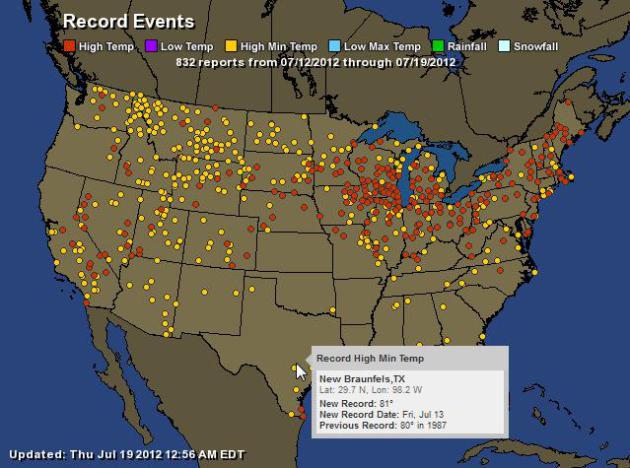 One Week: 832 Warm Weather Records
One Week: 832 Warm Weather Records.
What's impressive isn't just the scope of record highs, but the trends
at night - we're seeing far more (warm) nighttime low records
nationwide. Map:
Ham Weather.
Relatively Comfortable Thursday - Heating Up Again By The Weekend.
The ECMWF (European) model isn't hinting at 100-degree heat, but 90+
temperatures seem likely from Friday of this week through at least
Thursday of next week.
Widespread Drought Threatens U.S. Crops. This is a very good overview of the drought from
The Los Angeles Times; here's an excerpt: "
Many
cornstalks at the 1,200-acre Laird farm in Waltonville, Ill., had
wilted into brown, desiccated rows by the time the governor arrived
Monday to survey drought damage. Jim Laird, 71, has been raising corn,
soybeans and cattle in southern Illinois all his life, and has never
seen a drought this bad. This month, his family chopped down part of
the spoiled corn crop to supplement the hay they feed their 150 head of
cattle — hay that has become costly because of the drought....The
drought gripping the Midwest and about 80% of the country is the most
widespread since 1956, stoking massive wildfires and decimating the
nation's breadbasket crops, according to a report
released Monday by the National Drought Mitigation Center. Drought
conditions led the Department of Agriculture recently to declare natural
disasters in more than 1,000 counties in 26 states."
Photo credit above: "
People walk past longnose gars and a
catfish on a sand bar at the Platte River near the Louisville state
recreation area in Neb., Tuesday, July 17, 2012. Low water flow due to
lack of precipitation has exposed large areas of the river bed." (AP Photo/Nati Harnik)
Midwest Drought Forces Nebraska Farms To Halt Irrigation. A shortage of water is compounding the drought-related headaches for farmers in Nebraska;
Huffington Post and Reuters have more details:
* Farms told to stop using surface water for irrigation
* Surface water used in only 10 pct of irrigation systems
* Nebraska corn 70 pct silking, when water need is higher
* Crop conditions drop due to worsening drought (Updates with Kansas restrictions)
"More than 1,100 farmers in Nebraska have been ordered by the state's
Department of Natural Resources to halt irrigation of their crops
because the rivers from which they draw water have dropped due to a
worsening drought.
The orders come as the central United States is enduring the worst
drought in a quarter century, which has parched corn and soybean crops
and sent prices of both commodities to near-record highs."
Photo credit above: "
The exposed bottom of the Mississippi
River is baked and cracked by extreme heat and lack of rain Tuesday,
July 17, 2012 near St. Louis. The nation's widest drought in decades is
spreading, with more than half of the continental United States now in
some stage of drought and most of the rest enduring abnormally dry
conditions." (AP Photo/Robert Ray)
How The Drought Could Hit Your Wallet.
CNN.com has more on the implications for higher prices for the food we put on our table, here's an excerpt: "
With
more than half the country in some state of drought, farmers are
feeling the impact on their livelihood and consumers could expect to
feel a hit in their wallet when they go to the supermarket soon,
experts say. The U.S. is facing the largest drought since the 1950s,
the National Climatic Data Center reported Monday, saying that about 55% of the country was in at least moderate short-term drought in June for the first time since December 1956, when 58% of the country was in a moderate to extreme drought. The hot, dry weather in June,
which ranked as the third-driest month nationally in at least 118
years, according to the center, made the problem worse. That has left
farmers on the edge of their seat worrying about how much damage their
harvests will sustain and how much of their livelihood they may stand
to lose this year."
Photo credit above: "
Secretary of Agriculture Tom Vilsack
talks about the drought during the press briefing at the White House in
Washington, Wednesday, July 18, 2012." (AP Photo/Charles Dharapak)
How Droughts Will Reshape The United States. How will an increase in drought (frequency and intensity) impact the USA? Here's an excerpt of timely article at
The Washington Post:
"
2) Current droughts may be hurting U.S. corn yields, but they’re not yet causing a global food crisis.
The United States is the world’s largest exporter of corn and a key
supplier of soybeans. And right now, U.S. corn and soy production appear
to be wilting under the heat—the Department of Agriculture has cut its
corn-production estimate by 12 percent. If output ends up falling,
that would raise the price for corn, for biofuels, as well as for beef
(since corn is used to feed livestock).
More broadly, however, analysts still don’t think
we’re facing a situation like 2007 and 2008, when skyrocketing food
prices triggered riots in dozens of countries from Haiti to Egypt.
That’s because global wheat and rice supplies are holding fairly steady,
at least for now.
3) Climate change may already be making some U.S. droughts more likely.
Given that the United States experienced even more severe droughts in
the 1930s and 1950s, when carbon emissions were lower than they are
today, one might assume that modern U.S. droughts have little to do with
global warming."
* latest interactive U.S. Drought Monitor from NOAA
here.
Drought Worsens Over Plains - Mid Atlantic Soaking. NOAA's latest
QPF
(5-day rainfall outlook) prints out some 2-4" amounts from Mobile to
Richmond, Washington D.C. and Philadelphia, but not a drop of rain from
Nebraska southward to much of Texas.
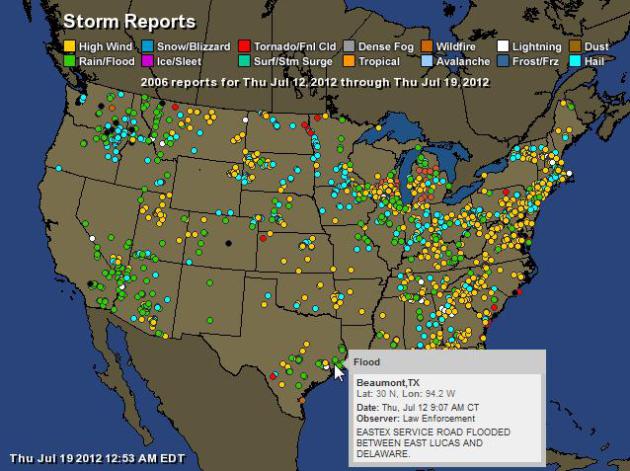 One Week's Worth Of Storm Reports
One Week's Worth Of Storm Reports.
Over 2,000 storm observations have been reported in the last 7 days,
including 3 tornadoes in the Red River Valley. Map above courtesy of
NOAA and
Ham Weather.
Thursday Severe Threat. A nagging frontal boundary
creates the convergence necessary for more strong/severe storms from St.
Louis to Indianapolis, Louisville and Pittsburgh later today, according
to NOAA SPC.
Shelf Cloud Time Lapse. Thanks to the Tampa office of the National Weather Service for capturing a
wild T-storm shelf cloud
that raced across the Riverview neighborhood early Wednesday. The
webcam was on a 1,600 foot tower. Kudos to WeatherNation TV
meteorologist Rob Koch for passing this along.
"Ask Paul." Weather-related Q&A:
Paul,
"
How come these big rain events always seem to cut off just north of
my neighborhood or happen south of the Minnesota River? I live near 98th
and Penn in Bloomington and I swear so often, when these big rain
events move into the Twin Cities area, the southern cut-off to the rain
seems to be just north of me, somewhere around 494 to say, around 86th
street or the northern cut-off is the river. I am pretty sure there is
no real reason, but I get frustrated when I hear the weather guys talk
about the heavy rain "we" had today, and I get no rain or, like this
morning, at best a minute or two of medium rain. Then I take a look at
the radar and the whole TC area is getting heavy rain. Unless it is some
huge drawn-out rain event like the 8-9" we got a month or so ago over
those couple of days, it really does seem to always go north, or,
sometimes, south of the Minnesota River.
As I said earlier, I am sure it is just luck of the draw, but it
really seems like my house is sitting in some sort of an "arid black
hole" that the rains fear to enter.
If you have any specific reason why this happens, I would be interested in hearing it. Otherwise thanks for letting me vent. :)
Sincerely,"
Craig Brown
Hi Craig - I feel your pain. Vent away, but I can assure you that
there is no meteorological conspiracy in play. It falls under the
heading of fickle summer convection. It's frustrating: town A can pick
up 2" of rain, while 5 miles down the road the sun is out and locals are
wondering what all the fuss is about! The metro is warmer and drier
than the outlying suburbs, which may inhibit the smallest showers - but
has little effect when a massive squall line of severe storms roar
across town. I haven't seen any convincing research that small
geographic effects, like living near a river valley, will make much of a
statistical difference in how much summer rain ultimately falls. Rain
"shadows" form downwind of mountain peaks out west, but we don't have
the geography (or large enough lakes nearby) to fundamentally nudge
Mother Nature in one direction or another. Hang in there - it will
(eventually) rain, but I don't see widespread/soaking rains looking out
the next week or so.
Paul,
In regards to the weather column in today's paper, I salute you for "toughing it out" without air conditioning.
My husband and I have made the conscious decision to live without ac in our home. See
my article, "Assuming good health, it's hip to be hot," in the Opinion
Exchange section, July 6, 2012 in your paper, the Minneapolis Star
Tribune. Also see the follow-up letter to the editor by Jay Thacker in the July 10 edition.
Your decision to live without air conditioning
shows your mature and intelligent recognition that what we choose to do
today has lasting effects tomorrow and beyond. Keep up the good work!
Shirley Erstad
Thanks Shirley - I'm no martyr, but the longer I
go without A/C the more I feel I really don't need it. We open up all
our windows, crank up the fans, sit outside in the shade until the house
cools down. I still like the idea of geothermal, which doesn't require
significant energy derived from fossil fuels. It's one of the few true
green no-brainers out there today.
Shelf Cloud. Thanks to Kim Coy-Kinney who snapped this shot near Cynthiana, Kentucky Wednesday evening. Photo via WeatherNation TV's
Facebook page.
Enlightening. Here's another impressive pic, courtesy of Charlie Gouin in Rhode Island, via
FB.
What Happened To The Falls? No, this doesn't look
anything like the classic postcard-worthy waterfalls at Yosemite.
Details from Yosemite National Park, via
Facebook: "
On
today's date last year, following a very heavy winter snowpack, the
Merced River was flowing at a high of 1,850 cubic feet per second
(cfs). Today's high flow (following a very dry winter) was 70 cfs!"
Ken Jennings Shocker: Mt. Everest Is Not The Highest Point On Earth.
Say what? Yes, my goal with the blog is to include stories that make me
do a double-take, hoping some percentage of dear readers also find a
few of these stories vaguely interesting. Here's an except from a
shocker from
Conde Naste Traveler: "
If
there’s one thing everyone knows about mountains—and given the state
of geography education today, that may be a pretty accurate
estimate—it’s that Mount Everest, in the Himalayas, is the Earth’s
highest point. But what if it wasn’t? What if Everest, with its famous
29,029-foot peak, was actually dwarfed by a mountain you’ve probably
never even heard of, an Ecuadorian volcano called Chimborazo?"
OnStar Now Helps Owners Rent Out Their Cars. This is pretty nifty, almost makes me want to run out and purchase an OnStar subscription. Details from
gizmag.com: "
Want
to make some money off that OnStar-equipped Cadillac of yours, that
sits unused all day? Thanks to a new partnership between GM and
RelayRides, you can now rent it out! RelayRides is a web-based car-sharing service, but unlike similar groups such as car2go and Zipcar,
it doesn’t have any vehicles of its own. Instead, members make their
own cars available, at times when they don’t need them themselves. The
group screens potential renters and provides liability insurance for
each rental, while members receive 60 percent of what renters pay to use
their car."
Almost Comfortable. Yes, it felt pretty good out
there yesterday - the round of heavy storms that rumbled across the
metro during the morning knocked down the temperature, and clouds much
of the afternoon kept us 5-10 degrees cooler than we would have been had
the sun come out. Highs ranged from 72 at Duluth and Grand Marais to 82
St. Cloud, 83 Twin Cities, and 90 at Rochester.
Paul's Conservation Minnesota Outlook for the Twin Cities and all of Minnesota:
TODAY: Some sun, sticky. Dew point: 65. Winds: East 5-10. High: 86
THURSDAY NIGHT: Partly cloudy - humid. Low: 70
FRIDAY: Hot sun. Ugh. Dew point: 63. Winds: S 7-12. High: 92
SATURDAY: Unsettled with intervals of sun; slight chance of a few T-storms. Dew point: 66. Winds: SW 8-13. Low: 72. High: 94
SUNDAY: Sunnier, a bit hotter. Dew point: 70 Winds: S 10-15. Low: 73. High: 95
MONDAY: Steamy sun, feels like 100-105 again by late afternoon. Low: 75. High: 96
TUESDAY: Tropical, few heavy T-storms possible. Low: 74. High: 93
WEDNESDAY: Last sizzling day? Still sweaty with a few storms. Low: 73. High: 92
Go Jump in a Lake
"Ruff".
That's what my 1 year old Spaniel, Leo, replied when I asked him about the effects of heat & humidity.
Sorry. A dire lack of A/C is going to my overheated brain.
The hottest weather of summer usually comes 3 to
4 weeks after the Summer Solstice. Right about now. Ancient Greeks
thought Sirius, the "Dog Star", the brightest star in the early morning
sky, was adding heat to the atmosphere. Thus the term Dog Days.
More panting and howls of displeasure are
imminent as yesterday's thundery front surges north once more. The
hottest days appear to be Friday; again Sunday and Monday, when mid 90s
may return. 100-degree heat is possible over southern Minnesota. A few
rounds of T-storms may keep us a few degrees cooler Saturday, but dew
points near 70 will make you want to go jump in a lake. My hunch: these
sporadic, hit-or-miss storms won't be enough to pull us out of a
deepening drought, the worst since 1956.
Breaking News! The European (ECMWF) model is
hinting at 70s next Thursday; a genuine "cool front" is one week
away.
But the drought will probably get (much) worse over the
Central Plains. I don't expect a run on grocery stores, but we'll all be
paying more for food in 2013. Count on it.
Climate Stories...
Record Heat Pushes U.S. Belief In Climate Change To 70% Bloomberg Businessweek has the details: "
A
record heat wave, drought and catastrophic wildfires are accomplishing
what climate scientists could not: convincing a wide swath of Americans
that global temperatures are rising. In the four months since March
there has been a jump in U.S. citizens’ belief that climate change is
taking place, especially among independent voters and those in southern
states such as Texas, which is now in its second year of record drought,
according to nationwide polls by the University of Texas. In a poll
taken July 12-16, 70 percent of respondents said they think the climate
is changing, compared with 65 percent in a similar poll in March. Those
saying it’s not taking place fell to 15 percent from 22 percent,
according to data set to be released this week by the UT Energy Poll."
Photo credit above: "
Evyn Schaeffer, 4, of Scotia, cools
off in a sprinkler at the Tri City BMX Track in Rotterdam, N.Y., as the
mercury hit 98 degrees, one degree short of the record 99 set back in
1900, on Tuesday, July 17, 2012." (AP Photo/The Daily Gazette, Peter R. Barber)
Health Hazards Of Heat Waves, Wildfires And Other Extreme Weather. Yes, a warming atmosphere may be hazardous to your health in a variety of ways, as explained in this story from
Huffington Post: "
Like
many Americans, I struggled to keep cool during the recent heat wave,
but what really worried me was how my father would handle the spike in
temperature. Medical experts say hot weather takes the heaviest toll on
senior citizens, young children and people with heart and lung
illnesses. Diabetics, the obese, and people using common medications
also face a greater risk when the heat rises. In other words, tens of
millions of people are vulnerable to extreme heat. Now that climate
change is making potent heat waves more commonplace, these numbers will
only continue to rise. NRDC recently released a report
concluding that an additional 33,000 heat-related deaths will occur by
2050 as a result of climate change. The summer of 2012 has already
delivered one record-breaking event after another, from wildfires to
freak storms. This barrage of destruction has prompted more
meteorologists and mainstream media outlets to finally make the
connection between extreme weather and climate change."
Not So Fast On Blaming Global Warming. Here's an excerpt of an Op-Ed from
The Washington Post: "
CAN
YOU BLAME the scorching weather on climate change? Not really. Or at
least not yet. In a National Oceanic and Atmospheric Administration (NOAA) report
released last week, researchers attempted to determine how much they
could attribute six extreme weather events last year to human-caused
global warming. Even now, months on, some experts worry that drawing
conclusions is precipitous. Figuring out what caused a flood in Thailand
or a drought in Texas is hard. Doing it quickly is harder."
Young Conservatives Seek Fixes For Climate Change. Here's an excerpt of an encouraging story at
greenvilleonline.com: "
On
the Facebook page for the group Young Evangelicals for Climate Change,
there’s a classic satirical “LOLchart,” except in this case the
numbers are real. A map of the United States is supposed to be colored
blue wherever temperatures have been cooler than normal, and orange
wherever they’ve been warmer than usual. It’s a useless distinction,
because the entire map is orange — June capped the country’s warmest 12
months on record. This, of course, doesn’t itself prove that humans
have provoked profound global climate change, and in the political
football that often erupts over the subject, the skeptics tend to
discount such maps, while believers note them with alarm."
Photo credit above: "
Jason Greer volunteers in the
community garden at Redeemer Presbyterian Church. Greer says things like
food co-ops and gardens are moving young people past the idea that
caring for the earth is a "liberal" thing." Heidi Heilbrunn/staff.
Lloyd Garver: Hot Enough For You? Yep, anyone
concerned about climate change is a tree-hugging, Al-Gore-Loving, pinko,
commie, left-wing, tax-loving liberal. "It's just an excuse to expand
government and kill the American Dream, Paul!" I hear that a lot. Tell
that to (soon to be broke) farmers in Nebraska, or 350 families in
Colorado Springs who's homes burned down, or the thousands of people
still without power out east in the aftermath of late June's freakish
derecho. Here's an excerpt of an Op-Ed at
sturgisjournal that captures the hypocrisy (and proud, on-display ignorance) of the perpetual denialists: "
Not
everyone believes in global warming. They feel that those of us who do
believe in it are "nutty left-wingers" or victims of "conspiratorial
pseudo-science." I'm always for fairness and giving equal time to all
viewpoints. So I present below the words of Harold K. Jefferson,
president of the "It's Not The Heat, It's The Hype" Association. "Hot
enough for you?" Americans have used that jovial and ironic greeting
for decades. Yet for the last several years, Left Wing-nuts have been
crying "Global Warming" every time the earth sets a few preposterous
heat records or a couple of dozen glaciers melt. Keep in mind that
those who believe in Global Warming are the same morons who believe in
evolution and gravity."
Photo credit: Lloyd Garver, LloydGarver.com.
Geoengineering Projects Around The World - Map. Here's an excerpt from
The Guardian: "
ETC Group
has produced a world map of geoengineering that represents the first
attempt to document the expanding scope of research and experimentation
in the large-scale manipulation of Earth or climate systems."
A Gripe With Global Warming. Here's an excerpt of a story at NRDC, the
Natural Resources Defense Council: "
According to the National Weather Service and NRDC’s Killer Summer Heat Report, heat
is the number one weather-related killer in the United States,
resulting in hundreds of fatalities each year. An average of 400 deaths
per year are directly related to heat, and an estimated 1,800 die from
illnesses made worse by heat - including heat exhaustion, heat stroke,
cardiovascular disease, and kidney disease. Across the nation
temperatures are rising along with the number of illnesses, emergency
room visits, and deaths.
The city of St. Louis is just one of many cities facing extreme
temperatures this year. As of yesterday, there have been a total of 17
heat related deaths this summer alone. But there are some that believe
global warming does not exist. The GOP is filled with climate change skeptics
who claim that global warming is an environmentalist plot to justify
higher taxes and limit your freedom. But studies show that Americans are
embracing energy-saving initiatives, from using recycled bags at the
grocery story to buying fuel-efficient cars."
Global Warming And The Higgs Boson. Here's an excerpt of a creative article from meteorologist Bob Ryan, at the
WJLA-TV Weather Blog in Washington D.C. "
OK
I admit I picked this title to get your attention. But there is a bit
of a parallel between the headlines of July 4 of the “discovery” of the
Higgs boson, global warming, climate and environmental change and the
way science works and how I hope how we learn. Indeed after the
announcement of the discovery, Washington then had 4 100° days in a row and the temperature reached 105° July 7. A coincidence you say?? Of course."
Can Adding Iron To Oceans Slow Global Warming? NPR tackles geoengineering in this piece that ran on
All Things Considered; here's an excerpt: "
A
noted oceanographer once quipped that if you gave him a tanker
half-filled with iron, he could give you an ice age. He was only
half-joking. Adding iron to the ocean can cause blooms of algae, which
have the potential to take huge amounts of carbon dioxide out of the
air and by so doing, cool the planet. And a report in Nature magazine
now offers some support for that idea. The premise of this experiment
is that algae growing in the oceans around Antarctica can't grow fast
because it's starved of an essential nutrient: iron. Victor Smetacek at
the Alfred Wegener Institute for Polar and Marine Research in
Bremerhaven, Germany, says iron in the ocean is as precious as water is
for plants on the land."
Photo credit above:
Marina Montresor, SZN/Alfred Wegener Institute. "
This
algae, called Chaetoceros atlanticus, can bloom in the ocean when iron
is added to the water. It captures carbon dioxide from the atmosphere
and carries the carbon down underwater when it sinks."
Profiteers Of Climate Change In The Arctic. It's
more than a little ironic - the same climate change many fossil fuel
companies are telling us is not happening is making the Arctic more
accessible to exploration and drilling. There's plenty of oil and gas
under that thinning Arctic ice. The paradox: our fossil fuel addiction
is creating the very conditions that's making it easier to recover even
more black gold. The story from
phys.org. Photo: NOAA.
10 Reasons "Clean Coal" Is Offensive. Here's an excerpt of an Op-Ed from
Huffington Post: "
According to the Washington Examiner
yesterday, President Obama's campaign team is going "on the offensive
to promote [the President's] support for clean coal". I am not sure if
the article is using "offensive" in the appropriate way when it comes
to talking about clean coal. Clean coal is nothing more than a made up marketing phrase that author Jeff Goodell best described:
In its 2004 'Arctic
Climate Impact Assessment', the Arctic Council found for the first time
that the Arctic sea ice was melting dramatically. This trend has
continued into the present, with researchers measuring the second-lowest
level of ice cover since 1979 in September 2011. Climate activists and
scientists warn that less ice leads to less reflection of the sun’s
rays, which heats up the atmosphere even more. In turn, melting land ice
accelerates the rise in sea levels. Yet this is a vicious circle that
gives rise not only to fears, but also to hope. The United States
Geological Survey estimates that 13 percent of all petroleum which can
be extracted using conventional means and 30 percent of all natural gas
is located in the Arctic, with 84 percent thereof in the sea, i.e.
offshore. The increasing pace at which the ice has been melting in
recent years will make it possible to access some large oil and gas
fields for the first time.
Read more at:
http://phys.org/news/2012-07-profiteers-climate-arctic.html#jC10 Reasons "Clean Coal" Is Offensive. Here's an excerpt of an Op-Ed from
Huffington Post: "
According to the Washington Examiner
yesterday, President Obama's campaign team is going "on the offensive
to promote [the President's] support for clean coal". I am not sure if
the article is using "offensive" in the appropriate way when it comes to
talking about clean coal. Clean coal is nothing more than a made up marketing phrase that author Jeff Goodell best described:
"Clean coal" is not an actual invention, a physical
thing -- it is an advertising slogan. Like "fat-free donuts" or
"interest-free loans."
It is PR spin not based in reality and President Obama and his
campaign team are playing a part in trying to dupe the public again,
much like they did in the 2008 election cycle. Coal is far from clean and no amount of spin or wordsmithing is going to change that."
D.C. Appeals Court Rejects Attacks On EPA's Greenhouse Gas Endangerment Finding. The latest from
Scholars and Rogues; here's an excerpt: "
On June 26, 2012, a three judge panel of the DC Court of Appeals ruled against 26 legal petitions by states and industry groups that had sought to overturn the Environmental Protection Agency’s (EPA’s) greenhouse gas (GHG) regulations. The Court’s Opinion
(hereafter “the Opinion”) found that “the Endangerment Finding is
consistent with the Massachusetts v. EPA and the text and structure of
the CAA, and is adequately supported by the administrative record.
[emphasis original]” The Opinion focused on three main arguments made by
the petitioners. The first, discussed below, was that the EPA erred
when it found that GHGs were a “reasonable threat to public health and
welfare” as defined by the Clean Air Act (CAA in quotes from the Opinion)."
Parents Need To Act Against Climate Change For Their Kids' Sake.
The Daily Beast has the story - here's a clip: "...
Beyond
the distress and discomfort, the record-breaking heat raises a
puzzling question for anyone who cares about the future of our young
people. The laws of physics and chemistry—the fact that carbon dioxide
remains in the atmosphere for decades after being emitted—mean that
man-made global warming is just getting started on this planet. As a
result, my Chiara and millions of other youth around the world are now
fated to spend the rest of their lives coping with the hottest, most
volatile climate in our civilization’s 10,000-year history. Think of
them as Generation Hot."
The Greening Of Professional Sports. This is an encouraging trend; here's an excerpt from
The New York Times: "
THE
White House is hosting a conference on the greening of sports on
Thursday to recognize the sports industry’s growing embrace of energy
efficiency, water conservation, recycling, healthier food and the role
it plays in spreading the environmental message. All the major
professional sports leagues in the United States will be represented at
the event, as well as scores of teams, site managers, athletes and
environmentalists. Through their nonpartisan leadership on the field,
court or rink, professional and collegiate sports and their sponsors
are showing their many fans practical, cost-effective solutions to some
of our planet’s most dire ecological issues."

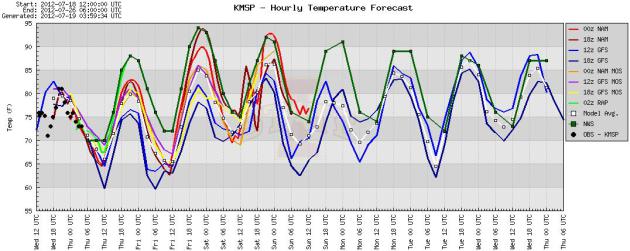


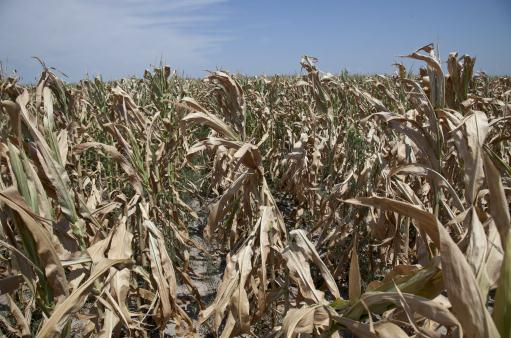
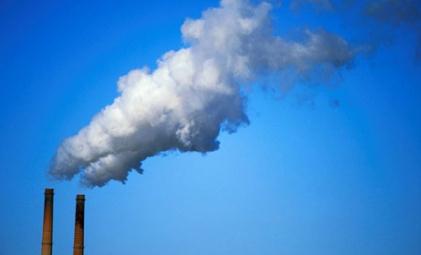


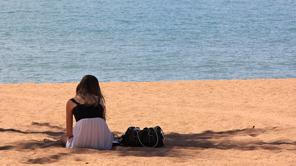
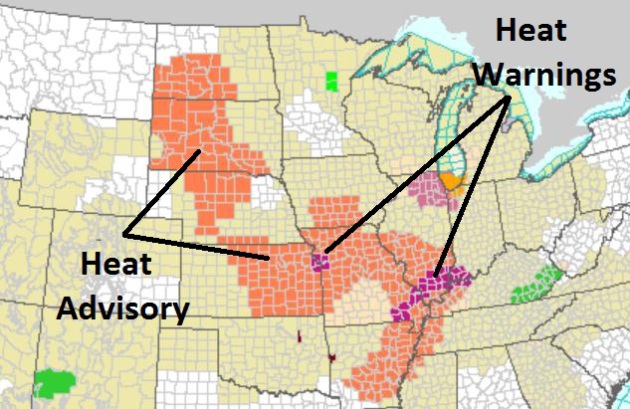


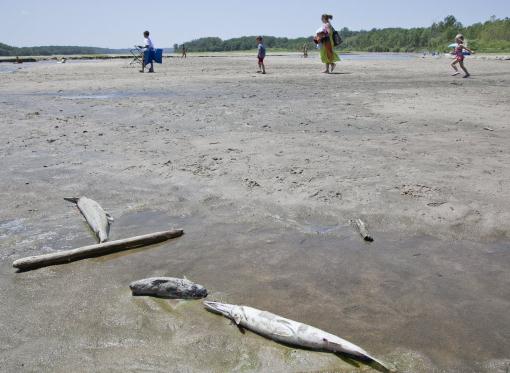
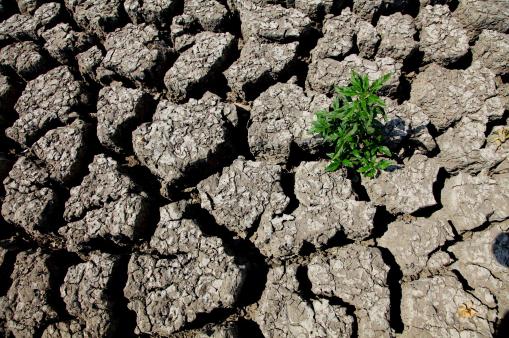
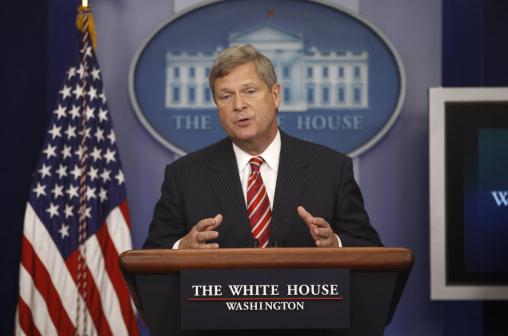
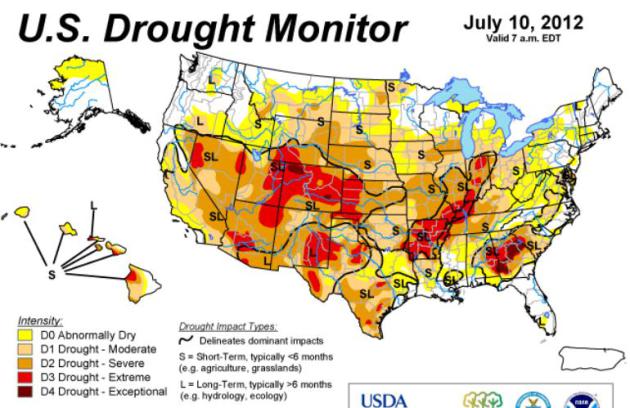
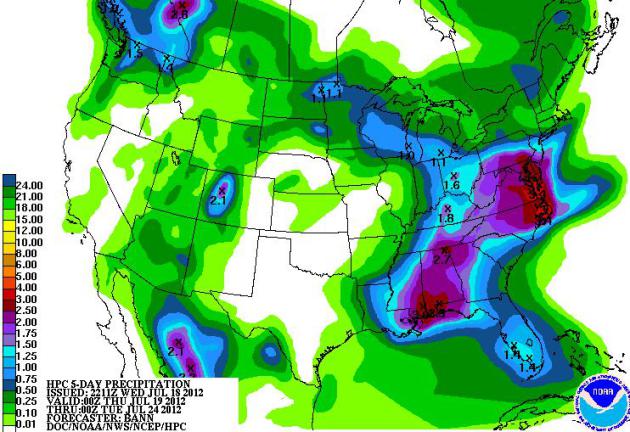

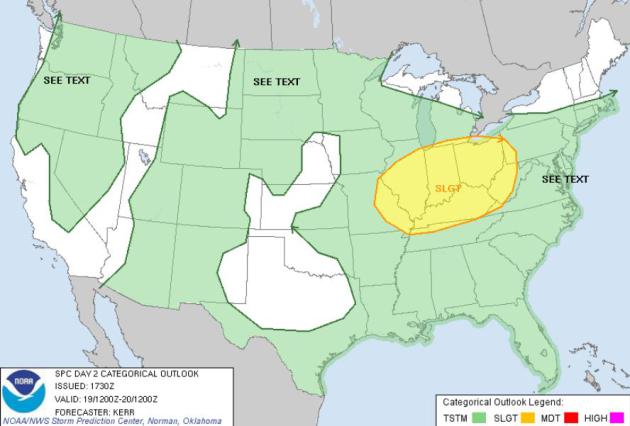
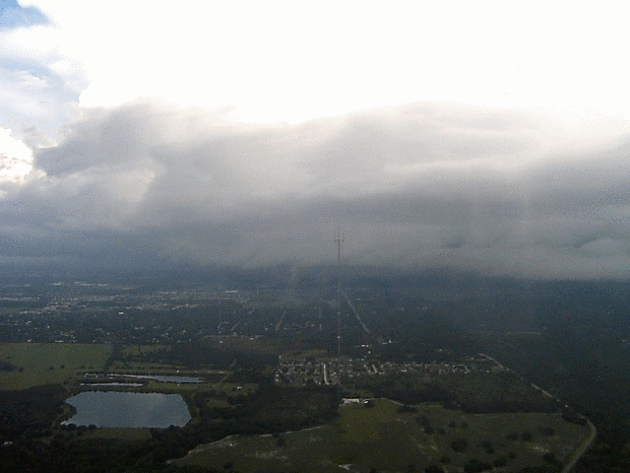
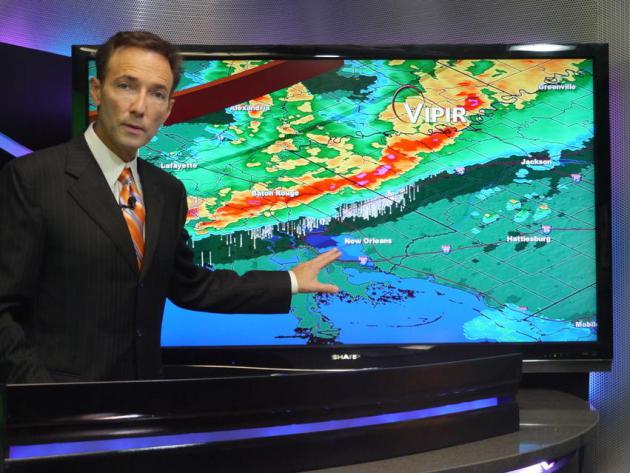
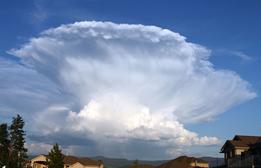

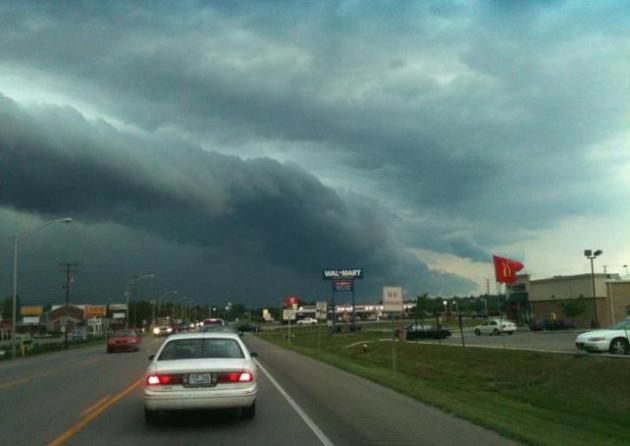
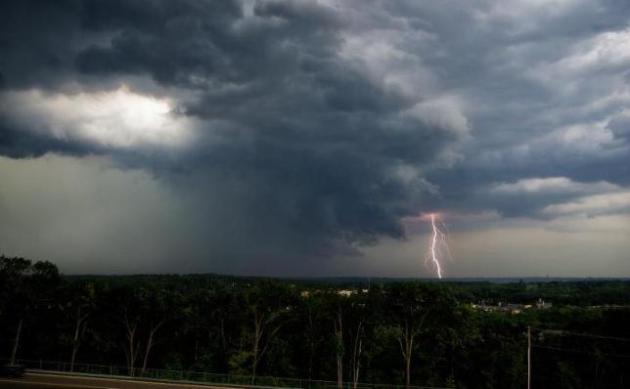
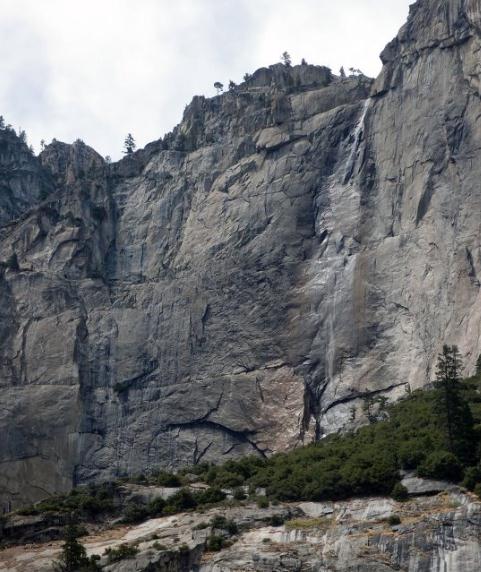
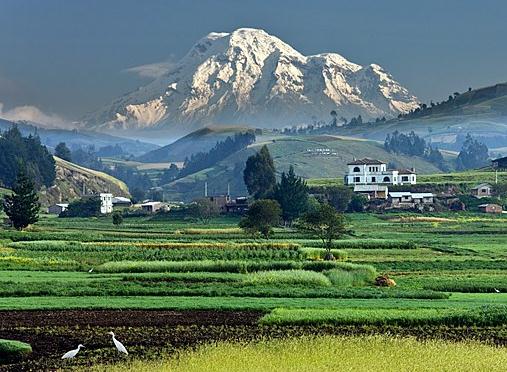

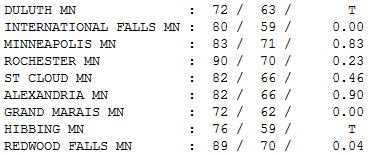
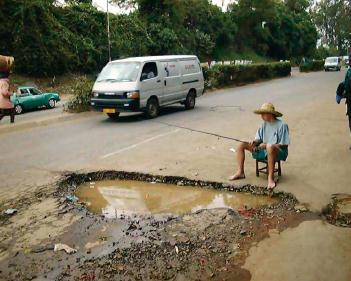
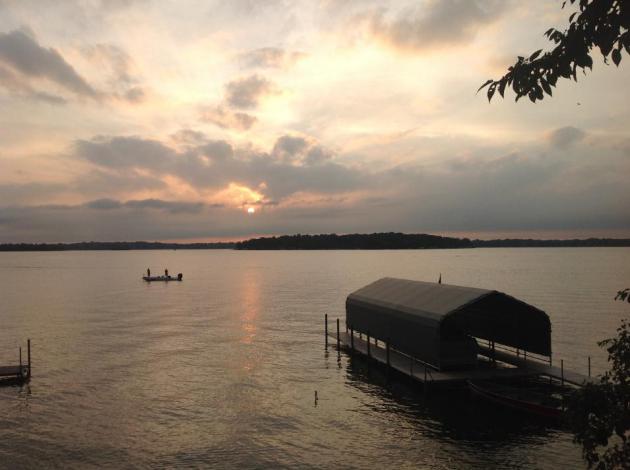
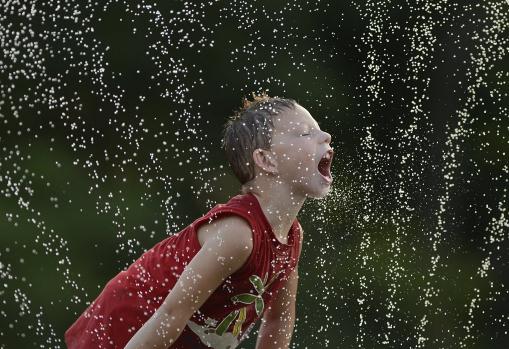
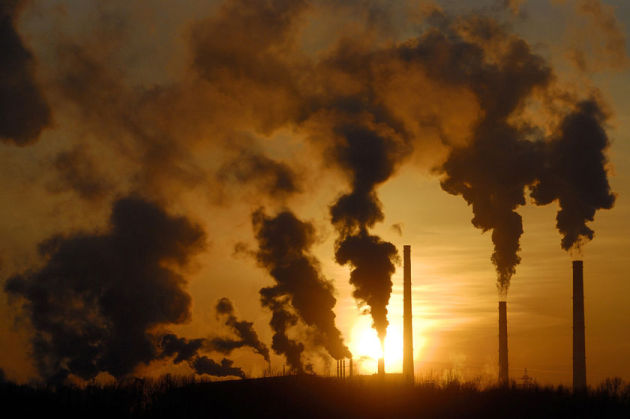
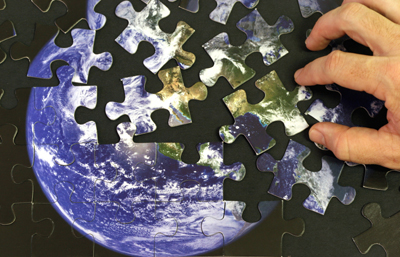
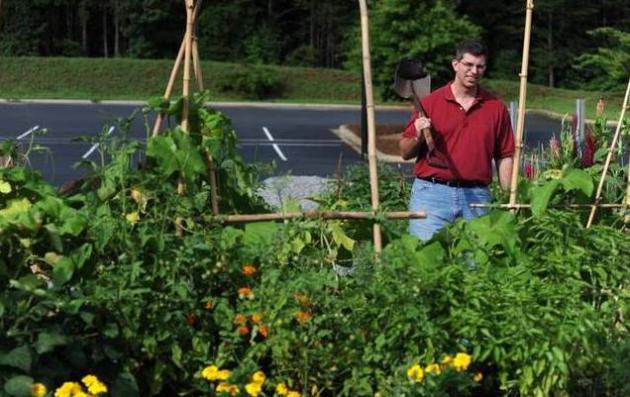
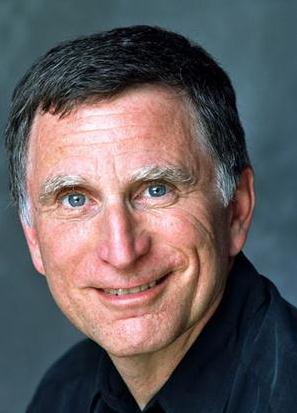
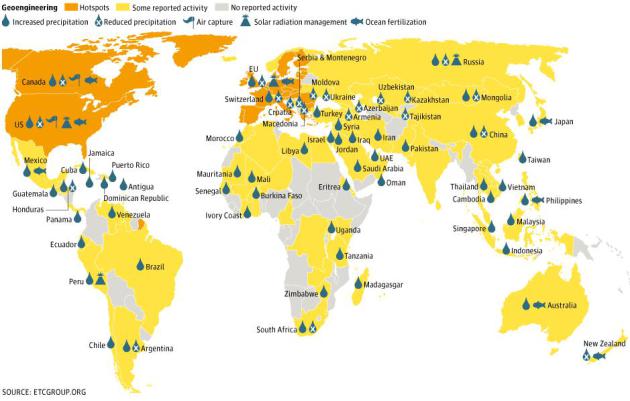
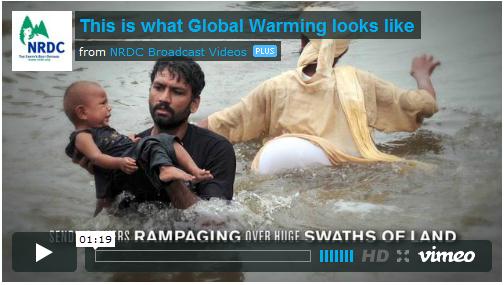
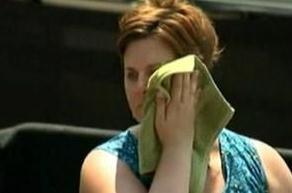

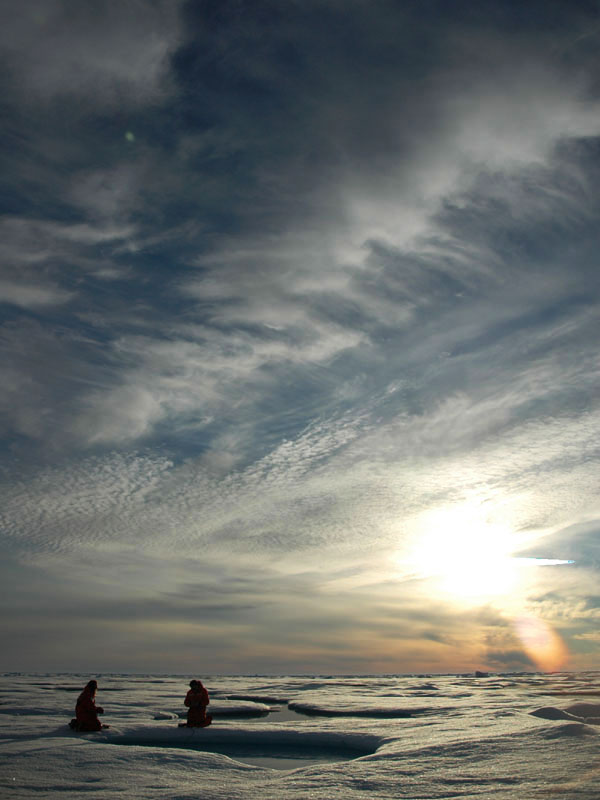
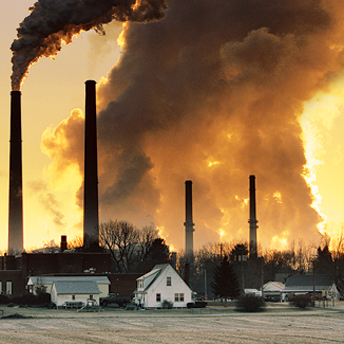

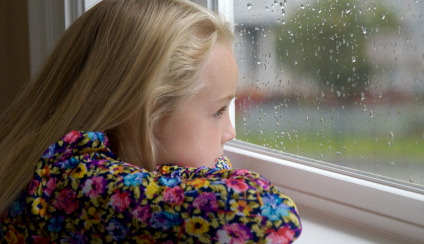
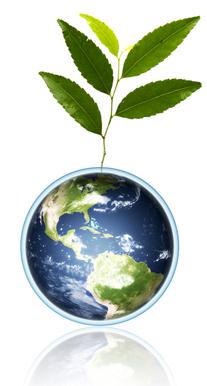
No comments:
Post a Comment